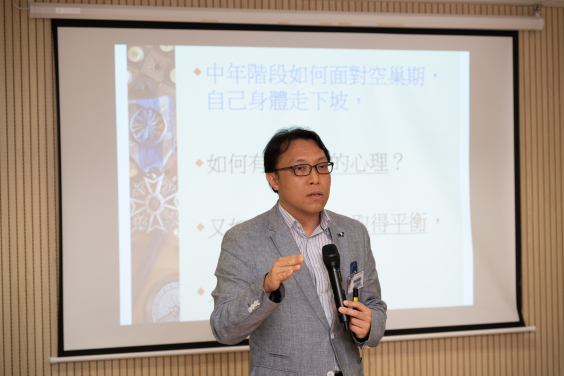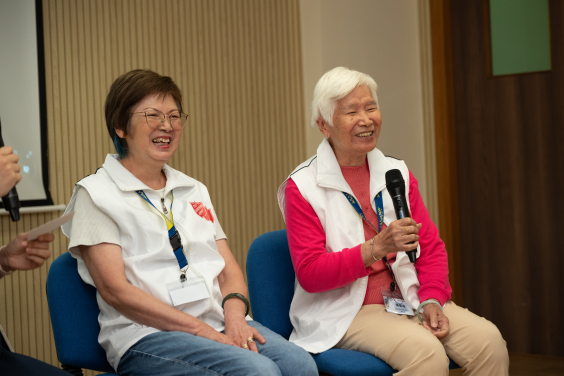Media
Jockey Club Community Elderly Mental Wellness Enhancement Project Explores an Inclusive Community with Senior Citizens in Their Everyday Life
17 Apr 2024

Attended guests (from left to right), including Ms. Katherina Lee, The Salvation Army Chuk Yuen Integrated Service Service Supervisor; Ms. Ramy Chak, The Salvation Army Youth, Family and Community Service Chief Manager; Ms. Carmen Lai, Project Coordinator of the programme; Dr. Sunny Liu Kwong Sun, Associate Director of CSRP; Prof. Paul Yip Siu Fai, Director of CSRP; Ms. Cecilia Wong; Dr. Wong Wai Ling, Training Facilitator of the programme; participants of the programme, Ms. Chan Choi Mui and Ms. Kinki Lau, Unit In-charge of Chuk Yuen Centre for Senior Citizens.

Dr. Wong Wai Ling shares the effectiveness of oral history interviews in promoting intergenerational communication – during the interview process, the elderly can reaffirm their life values. In the meantime, the youth gain an understanding of the life stories of the elderly through active listening.
The challenges of population aging and elderly poverty in Hong Kong have highlighted the importance of mental well-being for the elderly. To promote awareness of their mental well-being and explore the future development of intergenerational support, The Hong Kong Jockey Club Centre for Suicide Research and Prevention (CSRP) of the University of Hong Kong (HKU) and The Salvation Army Chuk Yuen Integrated Service have jointly organized a programme called “MIND - Me In a New Day Oral History Programme,” sponsored by The Hong Kong Jockey Club Charities Trust. CSRP and The Salvation Army Chuk Yuen Integrated Service held a seminar on April 15 to share the programme’s statistics and effectiveness. The seminar invited various guests for the sharing sessions, including Professor Paul Yip Siu Fai, Director of CSRP; Dr. Sunny Liu Kwong Sun, Specialist Psychiatrist and Associate Director of CSRP; Dr. Wong Wai Ling, the trainer of this programme and senior researcher of oral history; Ms. Kinki Lau, a registered social worker; and programme participants, Ms. Chan Choi Mui and Ms. Cecilia Wong. They call on stakeholders from all sectors to contribute to community support services and create an inclusive society that promotes the mental well-being of the elderly.
Jockey Club Community Elderly Mental Wellness Enhancement Project
Supported by The Hong Kong Jockey Club Charities Trust, CSRP launched a four-year project, “Jockey Club Community Elderly Mental Wellness Enhancement Project” in 2020 to promote the physical and mental health for the elderly in Wong Tai Sin District, which aims to foster mutual respect and support between the elderly and young people. The project goes beyond academic research and emphasizes practical benefits, it provides regular training for young volunteers and organizes activities to cater elderly’s needs and enhance their well-being. Today’s seminar on “MIND – Me In a New Day Oral History” is one of the key initiatives of the Project.
From Listening & Interacting to Understanding & Co-creating
The “MIND – Me In a New Day Oral History Programme” was launched in March 2021 and finished in January 2024. Over a hundred young volunteers participated in the programme, each receiving 20 hours of training in oral history interviewing techniques and communication skills with the elderly. The young volunteers were then matched with elderly residents of Wong Tai Sin District by social workers. With the consent of the elderly participants, the young volunteers would learn about their rich life experiences through oral history interviews. While listening to the stories shared by the older people, the young volunteers recorded the conversations and later crafted written narratives of their life stories. Additionally, the programme transformed the elderly life stories into audiobooks and created 3D figures based on the images they provided as a vivid demonstration to affirm their lives and experiences. These craftworks and the intimacy of connecting with young people encouraged the elderly to face life’s changes with a positive and proactive attitude.
In addition, the interactions between participants extended beyond the interview sessions, with some young and elderly individuals creating shared memories through activities such as revisiting the elderly’s childhood playgrounds, engaging in sports, and drawing together. The activities reflect that intergenerational integration helps promote a harmonious community.
Research Data and Trends
A total of 116 elderly participants took part in this research project. All participants were recruited from The Salvation Army Chuk Yuen Centre for Senior Citizens and were invited to complete questionnaires at three different timepoints. Participants from the intervention group showed a slight decrease in the proportion of individuals with depressive tendencies after the activity (from 31.58% to 28.85%), while the control group showed no significant changes across the three timepoints. In terms of subjective physical and mental health, among the elderly participants who initially had poorer conditions in the intervention group, there was a significant and substantial decrease in the proportion of individuals after the activity compared to before the activity and the observation period (from 35.09% to 14.55%). The control group did not exhibit a comparable decrease in this aspect. These changes indicate positive outcomes resulting from the activities in these two aspects.
Intergenerational Communication Models
Dr. Wong Wai Ling shared how oral history promotes effective intergenerational communication. Young volunteers from this programme engage in dialogues with the elderly using oral history interview techniques, which provoke positive thinking and self-reflection among the elderly as they revisit their personal histories during the conversations and reaffirm their life values. At the same time, volunteers actively listen to the oral history shared by the elderly and document their narratives. By bringing their stories to life, the craftworks can encourage the elderly to face life’s changes positively.
Mental Health and Community Support for the Elderly
When people approach their old age from middle age, their physical health and social functioning change drastically. Dr. Sunny Liu Kwong Sun shared some insights on adapting to these changes to encourage seniors to live fulfilling and mentally healthy lives. Dr. Liu stated that depression is commonly found in the old age population, with 10% of individuals over 65 diagnosed with depression, of which 3% are classified as severe cases. Furthermore, research shows that elderly depression can lead to various physical and psychological illnesses, even an increased risk of suicide. To prevent elderly depression, Dr. Liu recommends establishing regular exercising habits, ensuring sufficient sleep, and encouraging seniors to participate in group activities, expand their social circles, and continue contributing to society, as these factors contribute to improved mental health. Furthermore, Dr. Liu emphasized the importance of bridging the gap between the elderly and society for their mental well-being.
Practicing Intergenerational Harmonious Community in Everyday Life
Ms. Cecilia Wong, a participant in this programme, is a senior and a caregiver for her husband. She takes care of her husband’s daily activities with reduced mobility, including preparing meals and caring for his emotional well-being. Since they do not have children, they rarely have the opportunity to engage in deep conversations with young people. When Ms. Wong learned about the programme, which would allow her to share her stories and communicate with young people, she considered it a precious chance to understand the thoughts of today’s youth. In the meantime, young people’s conversation also brought her some fresh reflections. After sharing her experience with her husband, she unintentionally provokes him to step out of their home and participate in activities at the elderly center. When Ms. Wong signed up for the programme, she did not expect to gain such unexpected benefits, which brought her great happiness. Ms. Wong hopes that her participation in this programme can encourage her husband to extend his social circle and improve social interactions, thereby boosting his mood and alleviating her caregiving stress.
Another participant, Ms. Chan Choi Mui, is an old lady who lives alone in Hong Kong, while most of her family lives in mainland China. Ms. Chan said that in the Wong Tai Sin district, where she resides, most residents are elderly. Therefore, participating in the programme provides an uncommon opportunity for her to interact with young people in person. During the programme, Ms. Chan found that young people willingly dedicated their time and patience to listening and showed great curiosity about history and her stories. She believes that this programme, through oral history sharing and collecting her stories into audiobooks, preserves her own stories for future generations, making it an unforgettable experience. As Mr. Chan retold her life’s story, such a process allowed her to revisit both the hardships and joys; it reminded her to continue facing life positively. Ms. Chan expressed her intention to participate in intergenerational activities in the future since it makes her feel particularly energetic when interacting with young people.
About the HKJC Centre for Suicide Research and Prevention (CSRP), HKU
Founded in 2002, CSRP has established its worldwide reputation in suicide research and prevention and extended its scope of research to the well-being of individuals and the whole society. CSRP believes that empirical research would optimize practices and contribute to the improvement of society.
About The Salvation Army Chuk Yuen Integrated Service
The Salvation Army Chuk Yuen Integrated Service consists of four service units: Chuk Yuen Centre for Senior Citizens, Ping Tin Small Group Homes, Chuk Yuen Children and Youth Centre, and Chuk Yuen Day Care Centre for Senior Citizens. The Salvation Army Chuk Yuen Integrated Service is determined to provide “Family-oriented, Community-based, and Intergenerational Integration” services to the Wong Tai Sin Community.
For inquiries, please contact: carmenlai@hku.hk



